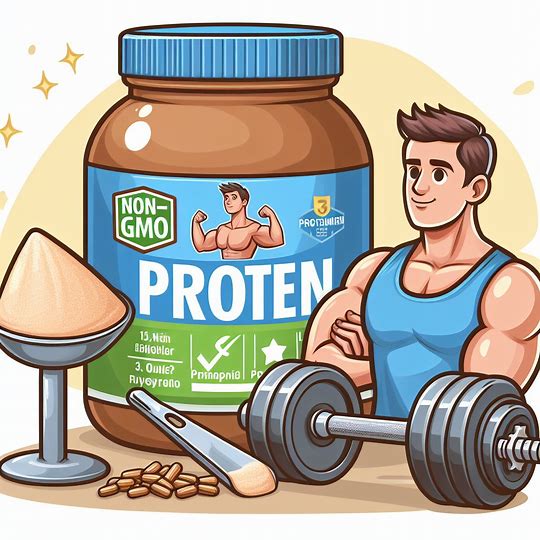Answer: Non-gmo protein powders are more expensive than regular protein powders. This is because of the lower quantity of suppliers, the market demand, consumer preferences, farming practises and strenuous certification process. The cost of non-gmo protein powders can start from being around the same price as GMO protein powders, to being substantially more expensive. Despite this, non-gmo are not objectively superior to gmo-protein powders. GMO ingredients can be just as healthy and safe as non-gmo. Additionally GMO protein powders can actually have more favourable macros than their counterpart, as the gmo-ingredients can be modified for an increased nutritional value.

Cost Factors:
Supply chain of non-gmo ingredients
In various countries, majority of the ingredients in foods contain gmo ingredients. This includes protein powder. Gmo ingredients are in majority of the foods that are consumed worldwide.
There are more GMO ingredient suppliers than non-gmo suppliers, as the former has been cemented in the market for longer. Since there are fewer suppliers, this means that suppliers can (and sometimes have to) charge more to those that wish to purchase such ingredients.
Until there are more non-gmo ingredient suppliers in the industry, current suppliers will charge more. If ingredients cost more, protein powder manufacturers are forced to make their product cost more in order to make a profit.
Market demand and consumer preferences
Recently, consumers want to be healthier in food choices and about half of adults believe that non-gmo is healthier than gmo.
What comes with this is the demand for protein powders that do not contain any GMO-Ingredients. When demand increases, manufacturers are able to charge more because consumers are willing to spend more money for what they want. Additionally, manufacturers are able to market their products as “premium” because of their ingredient list. As a result, “premium prices” will be applied.
Farming practises
GMO ingredients cost less to produce for farmers. GMO ingredients (such as soybeans, which is the source for soy lecithin; a common additive in protein powders) require less land, water, pesticides and herbicides. They also require less labour to manage. All this results in less costs in the long run for farmers.
Therefore, non-gmo protein powders use ingredients that require more land, water, pesticides, herbicides and labour. This, overall, shoots the price up.
Additionally, non-gmo crops can have lower yields than gmo crops. This means that in order for Non-gmo crops to have the same amount of yield as GMO crops, more overall resources will be required.
Certification process
Depending on the size of the supplier and financial capabilities, the certification process can become expensive. The costs include application fees, inspection fees, annual inspection fees, testing fees for verifying non-gmo status and overall costs associated with meeting standards. Without the advantage of genetic modifications, these crops may be more susceptible to pests and adverse weather, leading to smaller harvests.
Both in the short and long-term, these processes can be a frustrating expense on suppliers of non-gmo ingredients. It can also become a long and tedious process.
The underlying principle is that this can become a financial burden, meaning that suppliers have to increase costs and consumers will bear the consequence with prices.
Comparing to GMO
In general, non-gmo protein powders are more expensive than gmo-protein powders. It is not a massive price difference, but there is a noticeable contrast. The cost factors certainly reflect in the increased prices.
For example, a 1kg protein powder that has GMO ingredients could be priced at around $60. However, a non-GMO can easily be priced at around $90. Now this is an extreme example, but it does display how non-gmo protein powders can be priced higher.
It is possible to find a non-gmo protein powder that is only a few dollars higher than gmo-protein powders. Every manufacturer has their own circumstances, pricing points, and marketing approaches, so no two companies will be the same.
Is it worth it
For majority of people, the increase in price is not worth it. When I consider my own circumstances when buying protein powder, I have found that such an increase in price is not worth the claimed ‘benefits’.
It was found that non-gmo foods can be as healthy and safe to eat as the non-gmo counterparts. The difference in nutritional value and overall benefits is not significantly large. In fact, some gmo foods have been modified so that their nutritional value is increased.
Some GMO ingredients are resistant to viruses, bacteria, have herbicide tolerance and insect tolerance. This benefit is not present with the gmo ingredients, as they are vulnerable to these issues (and thus require more resource expenditure to maintain). There are more options with gmo protein powders than non-gmo, meaning that you’re more likely to find a protein powder with macros and flavours that you prefer.
However, gmo protein powders can have toxicological effects, changes in nutritional value and can contribute to overall greenhouse emissions. Additionally, the presence of GMO ingredients can cause worry for some consumers simply because there is a GMO label. The psychological impact is very evident.
At times, non-gmo can be healthier.

How to make an informed decision:
1. Consider how concerned you are about the presence of GMO-ingredients in your protein powder. For example, some protein powders have very few ingredients and only one of them may be GMO, such as soy lecithin for example. Furthermore, the amount of said GMO ingredient can vary. Analyse how concerned you truly are about the presence of GMO ingredients in your diet. It is not impossible for you to be overestimating the amount, the impact and significance of that GMO ingredient (s)
2. Email the manufacturer. At times, the ingredient list may not be as specific as you like. Majority of companies in the market offer a customer service option for those who wish to learn more about their product or to have an issue solved.
3. Consult a professional. If you are still concerned about the impact GMO-protein powders will have on your diet, consult a qualified professional.
Whilst you’re here, I have also covered why it’s important to not consume an excessive amount of protein powder, and this includes non-gmo protein powders.



